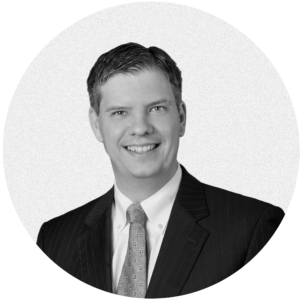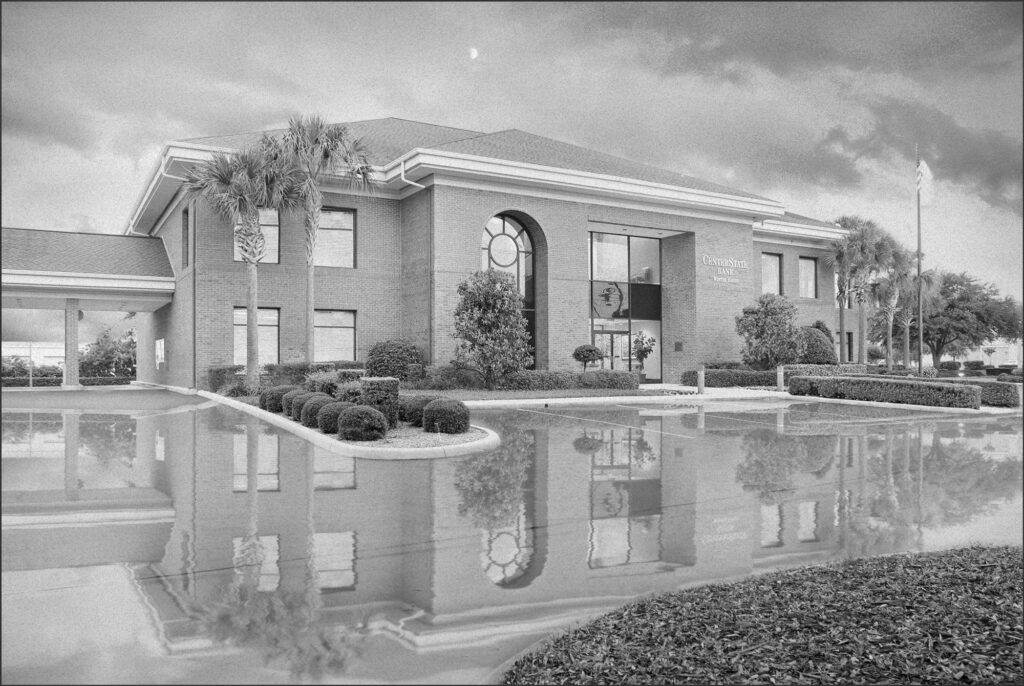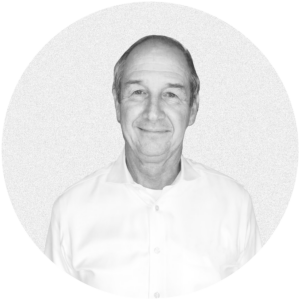In the midst of a renaissance, Winter Haven and its top leaders are encouraged by the possibility of what’s next (whatever that may be).

THE INFLUENCER: BRUCE LYON President, Winter Haven Economic Development Council
When Bruce Lyon was hired to run the Winter Haven Economic Development Council six years ago, the organization was less than two years old. It had a bookkeeping system and website.
“I was like, ‘Where are the files? What are the projects? Who are the people we’re working with?’” he says. That’s not to say he didn’t give credit to his predecessor; it’s just that Lyon had a few advantages coming into the position with fresh eyes.
A Lakeland native, Lyon had spent the better part of his career managing his own consulting firm, helping cities across America with economic analyses and project management. When his last job — a contract with Polk County to oversee a federal housing project — started winding down, the Winter Haven EDC President position came available.
“It was a great opportunity to focus on what I very quickly found was a really forward-looking, positive, collaborative community,” he says.
Lyon sees his position at the EDC as more of a facilitator. While there’s major growth happening in Winter Haven, he doesn’t directly touch much of it. Instead, he and EDC Project Manager Julie Sands help pave the way. And it all starts with connections.
When the two-person team — who started at the EDC within a few weeks of each other — took their positions, they set about introducing themselves to the neighbors, speaking at various clubs and associations, and engaging with organizations — the Florida Chamber of Commerce, Florida Department of Economic Opportunity, Florida Economic Development Council, and the EDCs in Haines City, Bartow, and Lake Wales. The point, Lyon says, was that when opportunity arises, he’ll be better equipped to collaborate and, thus, facilitate it coming to fruition.
Being proactive in order to be reactive, Lyon says, is the name of the game. “What do we do to address the opportunity that’s here?” is a somewhat rhetorical question he’s often asking.
An example: After CSX opened its Winter Haven terminal in 2014, bringing intermodal freight service to Winter Haven, the EDC strategized with various local, regional, and state organizations to utilize some of the transportation giant’s 318 acres for future projects, creating an Industrial Development Zone, a Freight Logistics Zone, and an Opportunity Zone. Because of those efforts, when Caribbean Distillers approached the city hoping to set up a new aluminum-can manufacturing facility, there was the perfect place available. The resulting three-phase project could yield approximately 800,000 square feet of advanced manufacturing, and potentially create 500 new jobs.
Lyon says he’s proud of the work he’s doing. It’s helping Winter Haven grow, and to his mind there’s no better place in which to invest himself.
“I’ve worked in 60 or 70 cities around the country, and there’s a short list that I would work for,” he says. “Winter Haven is absolutely at the top of the list.”
What’s Next
Lyon says one of the priorities on his current checklist is to help address the issue of multi-family housing in Winter Haven. With the population growing at a rate of more than three percent each year, the need is getting dire. “I’d say we’ve built 4,000 single-family homes (or thereabout), but multi-family? It’s not even close,” he says. “We’re out of balance, so we’re trying to bring the right resources to the community to do that. It’s a process.”
“You’re either serving chicken, or you’re serving somebody who’s serving chicken.” That’s not exactly the company motto at CenterState Bank, but, says its Executive Vice President and COO, Steve Young, it’s a great start.

The Culture Guy: Steve Young Executive Vice President and Chief Operating Officer, CenterState Bank
Let’s back up. A few years ago, CenterState — which began in Winter Haven in 1999 with only 40 employees — had grown to an 800-employee operation. Young, along with CenterState President John Corbett, could see it was destined to become an even bigger institution but wanted to ensure it maintained its core values: five tenets by which every decision, from the leadership team to individual bank tellers, is made.
“We looked around for companies that we admired,” Young says, “companies that have gotten bigger, but people really love to work with.”
That’s what led them to Chick-fil-A. Young and Corbett were introduced to its Vice President, David Salyers, who spent 37 years in the restaurant chain’s marketing department and by many accounts is responsible for its reputable culture. That appealed to the bank executives, and they tapped Salyers to help them make a somewhat unprecedented move: creating a culture committee.
“Most banks don’t have what’s called a culture committee,” Young says. “We think it’s the defining characteristic of who we are and why we talk about core values so much.”
 To be clear, it’s not that running a bank is anything like running a fried-chicken empire, but Young thinks Salyer’s saying (the one about serving chicken) can be easily translated: “You’re either serving a customer, or serving someone who’s serving a customer.”
To be clear, it’s not that running a bank is anything like running a fried-chicken empire, but Young thinks Salyer’s saying (the one about serving chicken) can be easily translated: “You’re either serving a customer, or serving someone who’s serving a customer.”
He adds, “We’re one of very few companies who have a culture committee. One of its purposes is to inspire, recruit, and reward our employees. We feel like if you take care of your employees, they’re gonna take care of everybody.”
“We think [Culture] is the defining characteristic of who we are and why we talk about core values so much.”
In addition to overseeing the bank’s mortgage and wealth management businesses, mergers and acquisitions strategies, and chairing the company’s asset-liability committee, it’s part of Young’s job to champion those core values, starting with No. 1: The company is local-market driven.
“You want to make sure, as you grow, that you’re not just growing for the sake of growing — that you’re growing meaningfully,” Young says. One of the ways they do that, he says, is by volunteering. In the last year alone, Winter Haven employees volunteered 1,500 hours of their time to organizations like Meals on Wheels, American Cancer Society, and others — often during the workday, which the bank encourages.
“Those are the kinds of things where you can really affect not only customers, but your community,” Young says. “That’s what we’re trying to do.”
Fast Facts
2700
The number of people CenterState Bank employs between its 650 community banks
2001
The year of CenterState Bank’s (CSFL) initial public offering
$17 billion
CenterState’s assets under management

The Developer: Bud Strang CEO, Six/Ten
When Bud Strang left Winter Haven for college, like a lot of his other friends, he vowed, “I won’t be moving back to that little town.”
“It’s interesting how many of us actually ended up coming back,” says Strang, whose company, Six/Ten, is responsible for much of the city’s recent downtown renaissance. Its list of projects includes Derry Down, Grove Roots Brewing Co., and the RainGarden Apartments, which was the first residential development project in Winter Haven’s downtown district in more than 20 years.
He moved back to Winter Haven in the mid-’80s and started working with his father, Carl Strang Jr., to acquire properties and businesses. But it wasn’t until about seven years ago that Strang paused to take stock of their acquisitions and realized most of them had something pretty interesting in common — they were located downtown.
“That’s when we started looking at this 80-block downtown core as one project,” he says. “That meant we had to start looking at residential, which we identified as one of the missing pieces. We needed people living downtown.”
Six/Ten started with RainGarden but isn’t stopping there. Strang says housing is the big priority for Six/Ten in the coming years, all in the name of attracting more people to call Winter Haven home.
What does your day-to-day look like?
We’ve got five or six projects underway; most of them involve some construction, whether it’s a renovation of an existing building or new construction. That design process is a time-consuming one, working with architects and engineers.
I tend to spend more of my time on the front end of the process, in the acquisitions of the properties. And we have a number of operating companies that we’re involved with, primarily businesses that are located in the downtown core. I probably spend 25 or 30 percent of my time working with the folks who are running those businesses. Every day is a little bit different.
What are you currently working on?
We acquired the old Lake Region Bank building on 3rd Street downtown, and we’re in the process of renovations. It’ll be primarily executive suites and flexible office offerings, a little bit of coworking space perhaps.
We also acquired the former Mann Sheet Metal business building on 5th Street. We’re not exactly set on what that’s going to be. It’s a great old industrial building. It could be a maker space, it could be an office, it could even be a restaurant.
One of our biggest projects — and this’ll be a new construction — is 105 multi-family units on the south end of downtown near Grove Roots Brewery. That’s taking a lot of time for the team right now.
What do you count among your most significant accomplishments?
I drive around downtown, and it’s easy to forget what downtown Winter Haven looked like 10 years ago and even five years ago. It’s come a long way. I think we’ve played a role in that, certainly (as have others), and I would put that at the top of the list. It’s gratifying to see all of the things that are going on downtown, to see other folks coming in and making investments.
